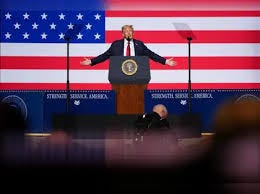Last: After Trump's "Enemies Within" Rant, Generals Must Choose Between Him or Their Oaths to Constitution
The reality TV president spared criticism of America's actual enemies - instead informing the military brass that troops should be deployed against fellow citizens.
By Jonathan V. Last /The Bulwark
If you were expecting Triumph of the Will in Donald Trump’s speech to military leaders Monday, you were disappointed because what you got instead was fat, disoriented Elvis stumbling through his set. Except that it wasn’t funny. It was dangerous.
I promise you that the flag officers in attendance were more alarmed than amused. And you should be, too.
1. “The Enemy from Within”
President Trump did not have many bad things to say about America’s foreign adversaries. He spoke about Vladimir Putin in largely neutral terms (only saying he was “disappointed” in him) and barely mentioned China.
He did, however, speak with great moral clarity about certain classes of Americans whom he views as a grave threat:
The American left: “They’re really bad. They’re bad people.” Again, he’s talking about Americans here.
His own domestic political opponents: “They’re vicious people that we have to fight, just like you have to fight vicious people. Mine are a different kind of vicious.”
American journalists: “sleazebags.”
Residents of American inner cities: “animals.”
2. The Home Guard
The most consequential parts of the commander-in-chief’s speech were the sections in which he attempted to prepare flag officers for increased deployment of the military in American cities.
He said that the military would now be assisting on border enforcement: “With your help we’re defending the borders of our country from now on.”
He called “inner cities” “a big part of war.”
He said America is “under invasion from within.”
That cities “that are run by the radical left Democrats” are dangerous places and “we’re going to straighten them out one at a time” and that “the people in this room are going to help with that.”
“They need the military desperately,” he said of cities with Democratic mayors.
More Trump:
San Francisco, Chicago, New York, Los Angeles. . . . That’s a war too. It’s a war from within. . . . I told Pete [Hegseth], we should use some of these cities as training grounds for our military—national guard, but military. We’re going into Chicago very soon.
In one of the teleprompter-read sections of the speech, Trump attempted to argue that there is long precedent for using the military as domestic muscle: “Our history is filled with military heroes who took on enemies both foreign and domestic.” He added: “George Washington, Abraham Lincoln, Grover Cleveland, George Bush, and others all used the armed forces to keep domestic order and peace.”
3. Rules of Engagement
Trump was open about how he wants the military to engage with civilians: He said that “quell[ing] civil disturbances” is “going to be a big thing for the people in this room.”
He then told a story about gangs of youths in Washington, D.C. who “treated [soldiers] with disrespect.” Trump gleefully reported that “they just got pounded” by the soldiers.
He told another story about civilians yelling at soldiers and getting so close to them that spittle came out of their mouths. The commander-in-chief then said that he had changed official policy that had previously required soldiers not to assault civilians who spit at them: “They spit, we hit.”
It is unclear whether these stories are real or apocryphal. But then, that’s the point, isn’t it?
4. Only Trump Is the Legitimate Leader
I cannot recall another instance of a commander-in-chief repeatedly denigrating his predecessors to the military, by name, in public. Trump went much further here than he did in his Fort Bragg and West Point addresses. A sampling:
He called “Biden and his team incompetent people” and lamented “the sleepy Joe Biden era.” “I call him the autopen” who “had no clue” and “shouldn’t have been there in the first place.”
Of Obama, Trump said: “Obama . . . I had zero respect for him as a president” and “he did a lousy job as president.”
Trump characterized Biden’s and Obama’s relationships with the military this was: “They did not treat you with respect. They’re Democrats, they never do.”
Most alarmingly, he said that Biden was an illegitimate president, the product of a fraudulent election, when he claimed that Russia never would have invaded Ukraine “if the election hadn’t been rigged.”
The obvious inference: Only Trump is the legitimate commander-in-chief who can be trusted by the military.
Bottom line: On the surface, Trump’s speech was ridiculous. Slump-shouldered and low-energy, Trump wandered and slurred. He said things that should make professional warfighters embarrassed—“We’re considering the concept of battleship.”
He talked about the Gulf of America and the Associated Press and the Supreme Court’s decision abolishing affirmative action. He claimed to have stopped eight wars in eight months. He made the case that he deserves the Nobel Prize. He said that every alleged drug-smuggling boat from Venezuela “kills about 25,000 people.”
But focusing on the ridiculous veneer is a mistake because the substance of his speech was as serious as a heart attack.
The entire senior leadership of America’s military has been put on notice. They now understand how Trump intends to use their forces. He told them, explicitly. He wants to deploy them to American cities where they will be used to “quell” disfavored groups, using force.
The generals understand that Trump sees their fellow Americans as his enemies. And they must now realize that at some point, they are likely to be forced to choose between Trump and their oaths to defend the Constitution.
Jonathan Last is the editor of The Bulwark, and writes “The Triad” newsletter daily. Subscribe here.

